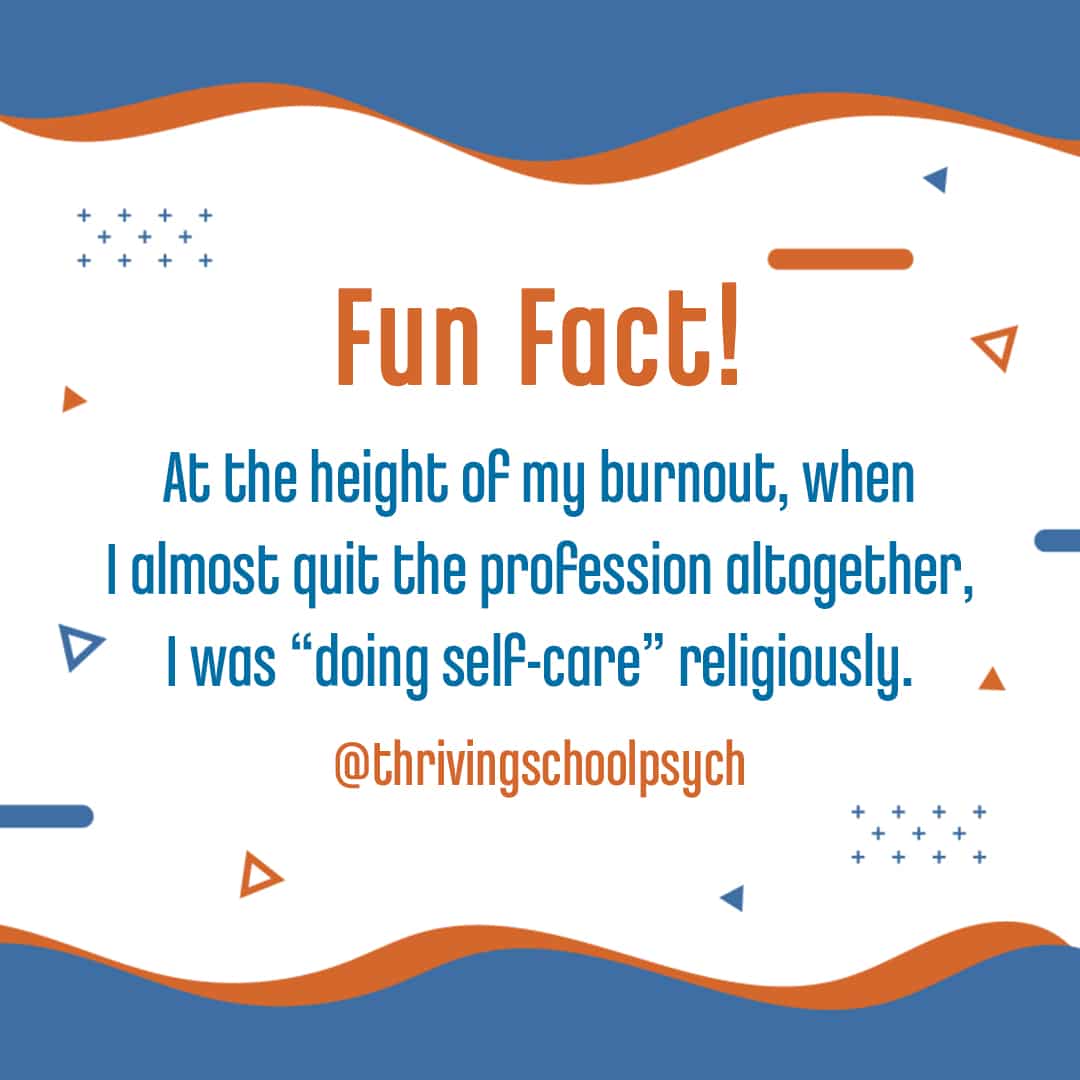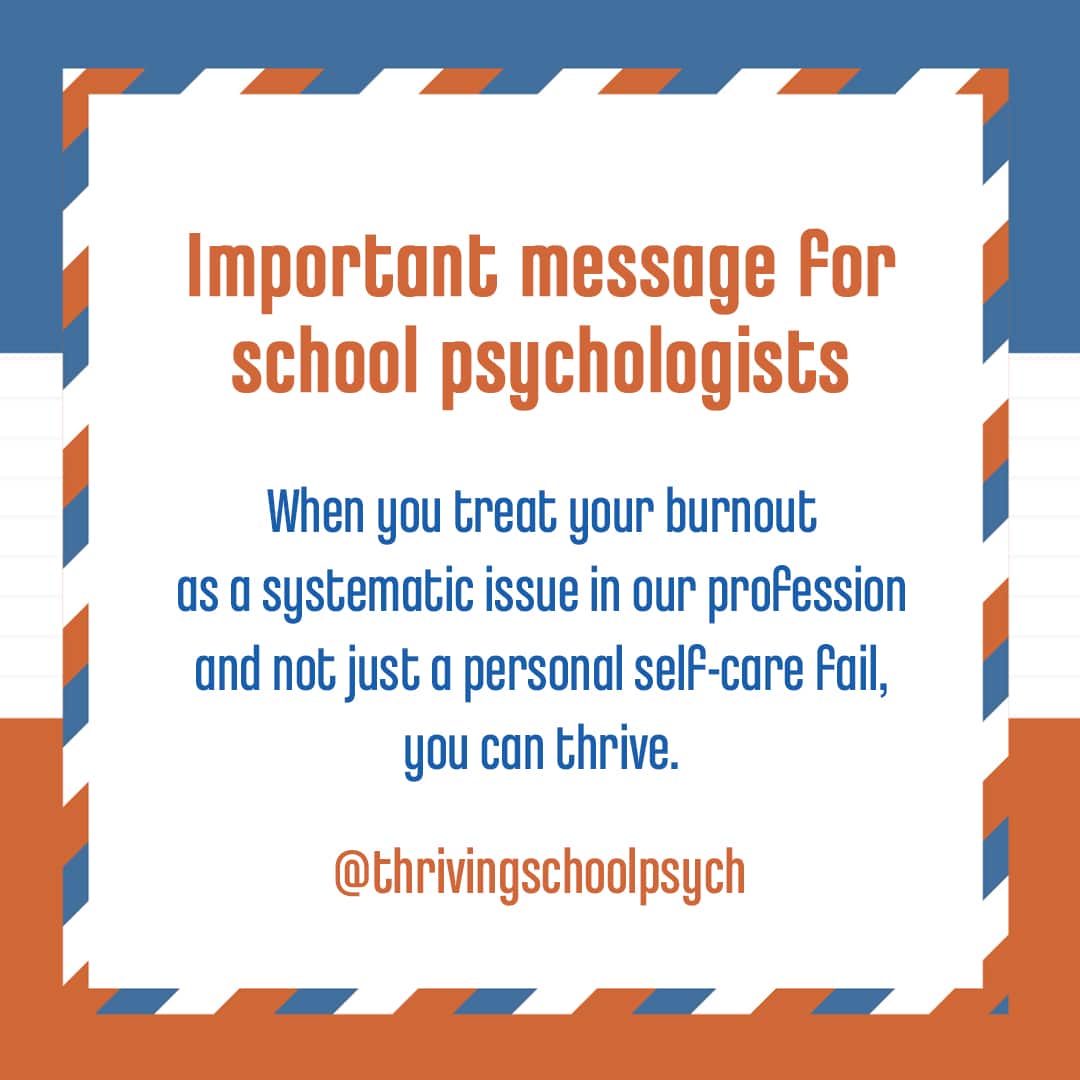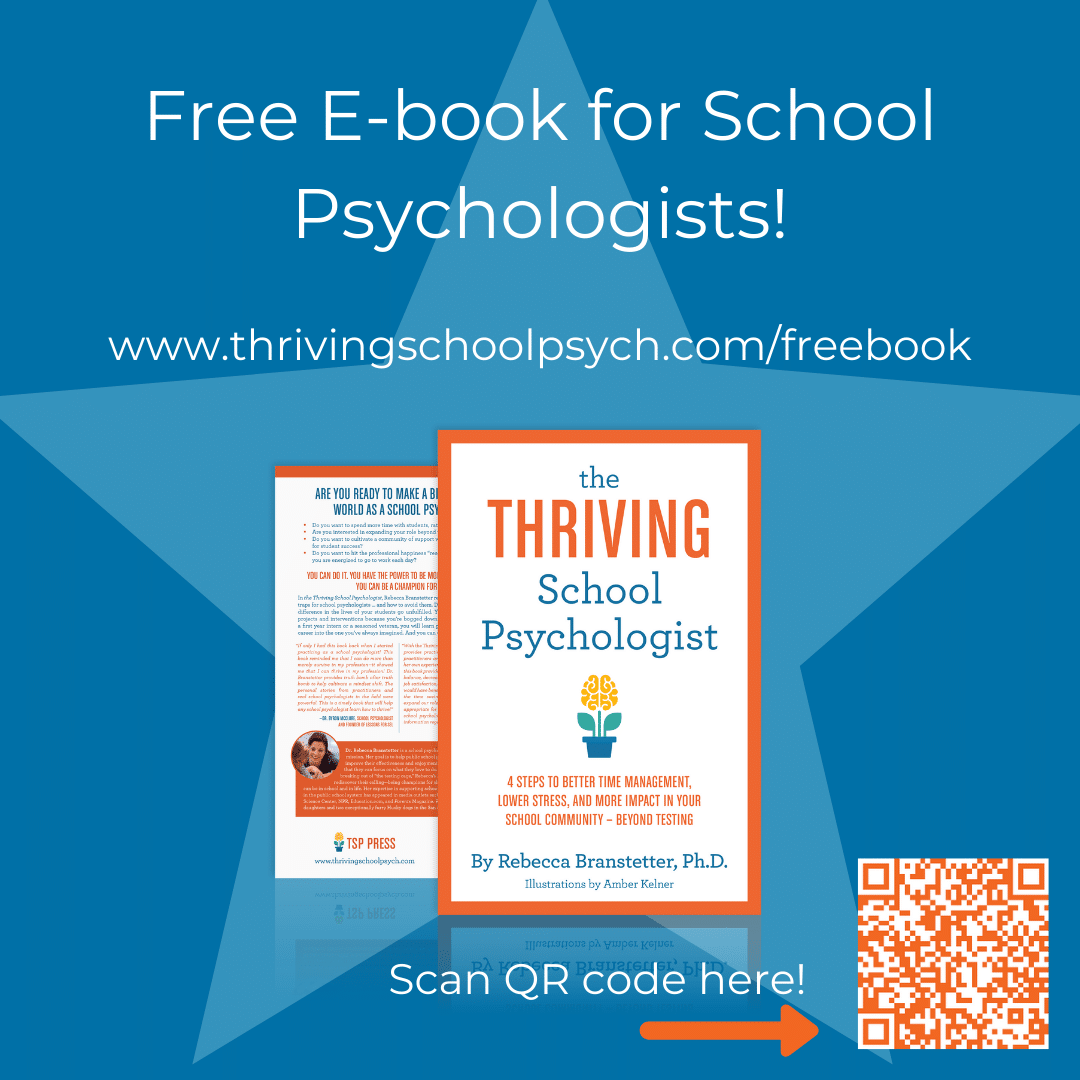When you think of someone who is burned out, it conjures up images of someone who is “phoning it in” — disengaged, uninterested, and hating their work.
That’s not what burnout often looks like for school psychologists and others in the helping professions.
When school psychologists get burned out, they still love their job and their students, but they may feel trapped in a role that only scratches the surface of what they can do to help kids.
They often feel demoralized at the state of educational systems in general and feel powerless to make changes.
Burnout for school psychologists rarely looks like “phoning it in” –in fact, it’s often the opposite— it’s overworking and feeling underutilized.

To add insult to injury, we’re implicitly told to “Self-Care Sunday” our way out of stress, by taking “me time” at the same time crises and legal deadlines are looming over us.
As if one relaxing bubble bath or a trip to the gym is going to counteract the daily stress of working in under-resourced school systems where school psychologists are frequently tasked with doing so much more with less time and resources every single day.
But it doesn’t have to be this way.
I know because I clawed my way out of burnout 10 years ago by embarking on a decade long Me-search (excuse me, RE-search) project on the science of happiness and burnout prevention for school psychologists. I’ve made it my life’s mission to share what I learned so others don’t have to suffer as I did for so many years.
Fun Fact!
At the height of my burnout, when I almost quit the profession altogether, I was “doing self-care” religiously.

After work, I walked my dog on the beach every day to decompress. I worked out 3 days a week in my hip hop cardio class. I spent time with friends and family. I took bubble baths. I was checking all the “Self-Care Sunday” boxes.
But self-care wasn’t enough.
I thought I was doing it wrong.
Why was I still so stressed out all the time? How come I couldn’t stop thinking about my endless to do list, the passion projects for my students I never got to, and all the students that needed help that weren’t getting it soon enough?
Perhaps I needed to add aromatherapy to my bubble bath routine?
I wish that someone had pulled me aside at the beginning of my career (oooh—maybe my future self, ala Doc Brown in Back to the Future!) and given me the advice I’ve learned from working with over 600 school psychologists on burnout prevention.
These tips, garnered from my community in The Thriving School Psychologist Collective would have saved me sooooo much heartache (Great Scott! If only I had a time-machine!):
Burnout Prevention Strategy Tip #1
 Thriving school psychologists eliminate and streamline bureaucracy.
Thriving school psychologists eliminate and streamline bureaucracy.
Research shows that decreases in small daily hassles improve job satisfaction, and many of these hassles are surprisingly within your control. I’m looking at YOU, redundant paperwork and report writing. Look, I love testing and yes, reports have value, but the number one complaint of school psychologists is they spend too much time chained to their laptops writing reports.
Back when I was first starting out, my time management skills that got me though grad school did not seem to work on the job. The problem was, though I was generally organized, traditional strategies were not sufficient. The time management adage “Do what is important first” didn’t work because IT WAS ALL IMPORTANT and my caseload was ridiculously high. So, I spent my days tending to the “crisis du jour” and then I brought home reports to write on nights and weekends.
The number one strategy that school psychs in my community say has been the biggest game changer in their time management is our “Eat the Frog” strategy. This gross metaphor comes from a Mark Twain quote that goes something like (I’m paraphrasing): If you eat a live frog every morning, then that’s the worst thing that will happen to you and it’s downhill from there.
What’s school psychologist’s “frog task?” What is something if we do first thing in the morning when we are fresh, will free us up for the rest of the day? You guessed it. Report writing. I invite you to try out this strategy—carve out the first hour and a half of the day for testing and report writing. As soon as that kid leaves your office from testing, score and write up what test you just did. This small activity leads to a very satisfying moment when you are days before the IEP and you open up a report to find it mostly done!
Burnout Prevention Strategy Tip #2
Carve out time for a small passion project that aligns with a bigger need at your school.
Research shows that using your skills and abilities to your full potential increases engagement and job satisfaction. Being more than a “testing machine” fuels your personal engagement and career sustainability.
You don’t have to revamp your whole MTSS team or build out a school-wide SEL program. Start with something small and put it on your calendar. What are you passionate about? Teaching mindfulness? Educating parents of kids with ADHD about how to help at home?
Even if it’s carving out 30 minutes of “think time” to research your passion project or setting up a collaboration time with a colleague who shares you passion, it can build momentum. Think big and start small! That mindfulness counseling group once a month, or that parent talk about ADHD could evolve into something big. And you’re going to feel excited about doing something new and breathe some excitement in your day!
Burnout Prevention Strategy Tip #3
Make a plan for connecting with other school psychologists.
Research shows that positive relationships with your colleagues is a protective factor against burnout. Connecting with other school psychologists decreases feelings of professional isolation and boosts positivity.
One of the challenges of our profession is, unlike teachers, we can’t just pop down the hall to consult with another school psychologist. And let’s face it: No one understands us like US!
We need that constant support, sounding board, and consultant for tricky cases and tough situations, and school psychologist friends are the BEST.
Plan for connection. Put it on the calendar as a regular appointment. Is it a monthly lunch? A Friday happy hour? A consultation group that meets regularly on Zoom? A text thread of encouragement with a group of trusted and fun school psychologists who lift you up? Find what works for you and make connection a habit.
Burnout Prevention Strategy Tip #4:
Practice self-compassion in addition to self-care.
Research shows that people who are happy in their jobs tend to be happier all around and similarly, generally happier people tend to enjoy their jobs. Happiness “broadens and builds” our cognitive resources. It makes us more creative, better able to handle stress, and be better problem-solvers.
So, cultivating happiness isn’t just a nice thing to do to feel good, it also makes us better school psychologists.

It’s been a long journey for me to embody this principle as something I actually do, and not just something I know I should do.
I used to “do self-care” by walking my dog after work. But mentally? I beat myself up on that walk, ruminating about how I was not being efficient enough in the day.
I used to “do self-care” by going to the gym. It definitely helped my mood, but I still had the “Sunday Dreads” because I knew I had unfulfilled passion projects that would help kids, but I didn’t have time for them.
And I used to “do self-care” by taking bubble baths, but would hop out and end up working on a report until midnight.
Self-care is only one part of the equation for burnout prevention.
We must also hold ourselves in self-compassion for doing the best we can with the resources and time we have (props to Kristen Neff for this gem!) We must cultivate that “treat yourself like you would a bestie school psych friend” energy. Next time you’re stressed out, ask yourself what advice you’d give a close friend. I guarantee it’s going to be good, just what you need, and much better than what you are currently doing for yourself!
School psyching is hard. But it’s worth it. You can make a huge difference in the life of kids and have a long, fulfilling career, even in difficult circumstances.
When you treat your burnout as a systematic issue in our profession and not just a personal self-care fail, you can thrive.
But maybe we should all go out and buy some lavender bath oil anyway? You know…just in case it helps too? 🙂

Rebecca Branstetter, Ph.D., is a school psychologist, speaker, and author on a mission to help children thrive by supporting school psychologists, educators, and families. She is the founder of The Thriving School Psychologist Collective®, an online course and community dedicated to improving mental health and learning supports in public schools by supporting school psychologists. ***ENROLLMENT OPEN NOW THROUGH AUGUST 15th, 2021 – CLICK HERE***
Want to learn 4 steps to better time management, lower stress, and more impact in our school communities—beyond testing? Download your FREE E-book copy of The Thriving School Psychologist here!
This blog post is also available on NASP’s blog. If you want to see Dr. Branstetter’s full one hour training on moving Beyond Self-Care Sunday for one NASP-approved unit, click here!

THANK YOU for this terrific advice (actually just the reminder I REALLY needed today as I, on a Sunday, am working on a report I couldn’t get done at work….and I’ve heard it before from you! And read it in your fabulous books!)
But, I believe that, well, at least for me, I need these little reminders from experts … which is really why I try to open your emails when I get them….. So, that’s another excellent strategy for me…..read notes/sage advice from Dr. Rebecca Branstetter…..when they come in!
Maybe it’s kind of part of your sage advice about connecting with other school psychs….This is how I do it (in concert with those at work!)
So, HUGE THANK YOU!
Awwww…Suzie thanks for posting that! You are a school psych “marigold” for sure! And 100% agree– even I need to remind myself of these things! Making change is not a one time event and even though school psychs KNOW so much of this, it’s all about having a community of school psychs who can help us EMBODY the ideas and make self-care and connection a habit. For folks like me who have done THE OPPOSITE of what I know to do for self-care for a long time, it’s a “spiraling curriculum” we must revisit frequently! 🙂
Thank you Rebecca. This is an excellent article and made me feel so much better. I’ve been doing self-care, massages, yoga and am still stressed out. What’s funny is I bought Kristen Neff’s book, “Fierce Self-Compassion” three weeks ago anticipating returning to another crazy, COVID school year. So, I love that you included her here. Thanks for always making me feel much more positive.
Thanks for taking the time to share your experience and your kind words! 🙂 I think you’ll like her book! Also if you want some school-psych specific self care, my new book is now free in the ebook version and I have a whole chapter based on Kristin Neff’s idea of the “Yin and Yang of Self-Compassion” for school psychologists. You can grab your free copy here: http://www.thrivingschoolpsych.com/freebook. Hang in there, friend!!! –Rebecca